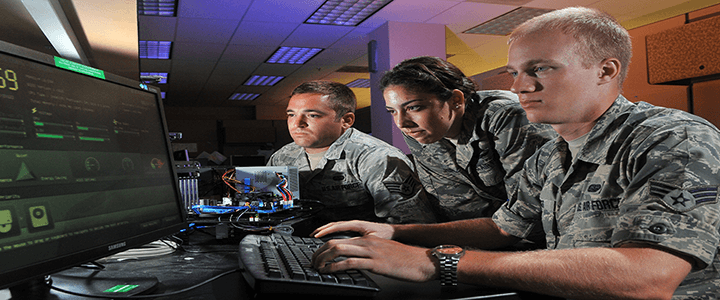The geo-political climate of 2017 is very different from that of just a decade ago, and is completely unlike anything seen even in the Cold War. Today there are increased regional threats from nations seeking to flex their muscles, such as Iran and North Korea, while Russia and China continue to expand their spheres of influence.
Even as the United States remains engaged in a conventional war in Afghanistan and all eyes are fixed on the Korean Peninsula, cyber threats remain prevalent. The question is whether America can tackle both convention and cyber concerns simultaneously.
“We certainly can,” said Robert Farley, senior lecturer at the Patterson School of Diplomacy and International Commerce. “First, while the war in Afghanistan has dragged on, it has been a manageable drag on our military – and also on the foreign policy attention of the United States. We appear for better or worse to have been able to compartmentalize what it is happening there and not affect our other policies.”
could cyber shift our foreign policy backwards?
The bigger concern is that cyber could pit the United States against past adversaries, notably the Russians and Chinese.
“Russia has been ‘testing’ cyber war on a small scale for over a decade,” warned AviramJenik, CEO and founder of cybersecurity firm Beyond Security. “China is a bigger mystery since we have not seen them doing anything we can directly attribute and can only infer, and that inference draws a scary picture.”
One danger is the potential that cyber presents in waging wars at a great distance, and this can include not only direct confrontation, but Cold War styled “proxy wars.” Instead of being fought in a distant jungle or desert – Vietnam and Afghanistan come to mind – cyber has the potential to allow the “combatants” to stay in the shadows of the Dark Web.
“With cyber you can go (wage war) anywhere in the world, and attribution is very difficult, so it makes it hard to prove who you say it is,” said Dr. Emma Garrison-Alexander, vice dean of the cybersecurity program at the University of Maryland University College.
The move toward elevating U.S. Cyber Command to a unified combatant command is one that could come at just the right time.
“There are domains from a military standpoint,” Garrison-Alexander told ClearanceJobs. “These include ground, air, maritime and space – now cyber space is the new domain for warfare; and when you look at it from that perspective it is a very legitimate concern.”
The reality of cyber attacks is not up for debate – from the Office of Personnel hack which compromised the personal records of more than 20 million, to the ongoing threat of foreign intelligence officers on LinkedIn. But in all of these incidences, attribution is a difficult argument to make, and the countermeasures largely happen behind classified doors.
“That’s something scary about cyber war,” Jenik told ClearanceJobs. “Unlike conventional war, which is almost binary where once the first shot is fired, the war is on; cyber can be done quietly, covertly and under a cloud of deniability. Will we send bombers to Moscow or Beijing if a main water reservoir is contaminated due to ‘software error’ in the purification plant? What if we find credible evidence it was hacker attack; could we link the attackers to Russia or China?”
One other scary point is what is at stake in a cyber war, added Jenik. “Out of the three: China, Russia and the United States, we have the most to lose from any cyber war, given the amount of infrastructure that is now mostly or entirely cyber-based,” he warned. “This is the exact reverse from every war the U.S. fought in the 20th century, which were all fought on foreign land.”
The other worry is that it isn’t just China and Russia that could be building up their respective cyber programs. Cyber could be a way for smaller nation states to be the David that takes on Goliaths such as America.
“In many ways this makes it harder for us,” said Tate Nurkin, senior director of thought leadership within the IHS Aerospace & Defense group. “Unlike during the Cold War when you had to contend with the Soviet Union, now you have other states that may not be as easy to deter and that can require some savvy diplomacy. During the Cold War there were expectations of how states would behave. That framework has eroded and that makes the world a little scarier in that sense.”
Onward Cyber Warriors
One thing may be certain – for those looking to serve their country on the frontlines of the next war, it might mean doing so with a keyboard, rather than a rifle.
“Cyber does provide that opportunity to serve,” added Garrison-Alexander.
This isn’t the first time either the United States government and military have seen the need for more “geek-minded” individuals to do their part.
“We forget that we had a similar situation in the early 1980s to the 1990s when the computer boom took off,” said Garrison-Alexander. “Once again there is a need for those with computer skills. Everything today in the government and military has some sort of cyber connection, and the good news is that those are highly transferable skills when you make the transition to civilian and non-government careers.”



